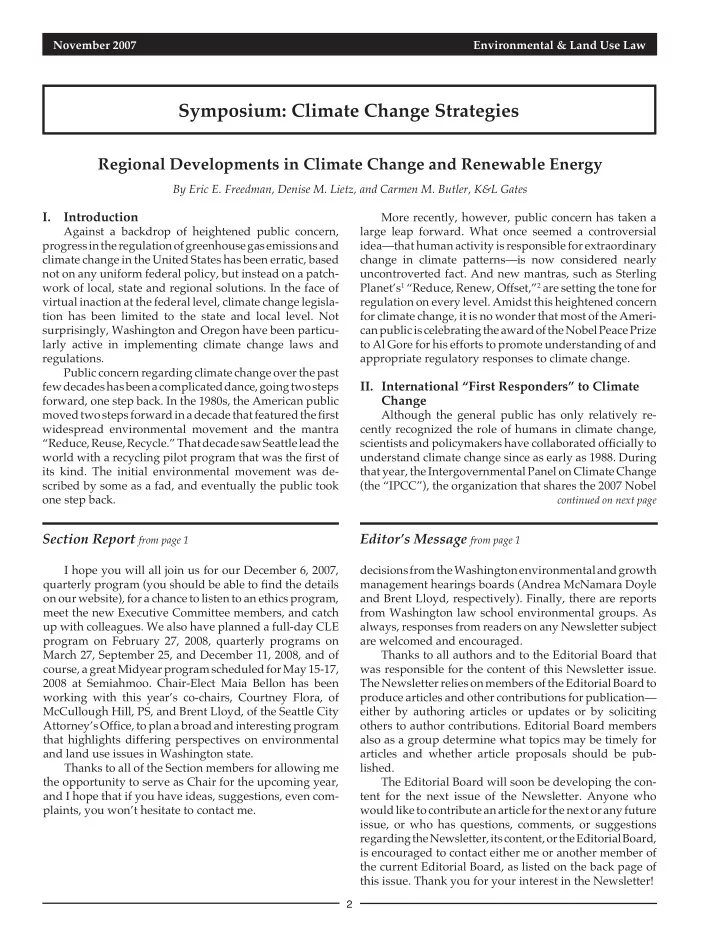

November 2007 Environmental & Land Use Law Symposium: Climate Change Strategies Regional Developments in Climate Change and Renewable Energy By Eric E. Freedman, Denise M. Lietz, and Carmen M. Butler, K&L Gates I. Introduction More recently, however, public concern has taken a Against a backdrop of heightened public concern, large leap forward. What once seemed a controversial progress in the regulation of greenhouse gas emissions and idea—that human activity is responsible for extraordinary climate change in the United States has been erratic, based change in climate patterns—is now considered nearly not on any uniform federal policy, but instead on a patch- uncontroverted fact. And new mantras, such as Sterling work of local, state and regional solutions. In the face of Planet’s 1 “Reduce, Renew, Offset,” 2 are setting the tone for virtual inaction at the federal level, climate change legisla- regulation on every level. Amidst this heightened concern tion has been limited to the state and local level. Not for climate change, it is no wonder that most of the Ameri- surprisingly, Washington and Oregon have been particu- can public is celebrating the award of the Nobel Peace Prize larly active in implementing climate change laws and to Al Gore for his efforts to promote understanding of and regulations. appropriate regulatory responses to climate change. Public concern regarding climate change over the past II. International “First Responders” to Climate few decades has been a complicated dance, going two steps Change forward, one step back. In the 1980s, the American public moved two steps forward in a decade that featured the first Although the general public has only relatively re- widespread environmental movement and the mantra cently recognized the role of humans in climate change, “Reduce, Reuse, Recycle.” That decade saw Seattle lead the scientists and policymakers have collaborated officially to world with a recycling pilot program that was the first of understand climate change since as early as 1988. During its kind. The initial environmental movement was de- that year, the Intergovernmental Panel on Climate Change scribed by some as a fad, and eventually the public took (the “IPCC”), the organization that shares the 2007 Nobel one step back. continued on next page Section Report from page 1 Editor’s Message from page 1 I hope you will all join us for our December 6, 2007, decisions from the Washington environmental and growth quarterly program (you should be able to find the details management hearings boards (Andrea McNamara Doyle on our website), for a chance to listen to an ethics program, and Brent Lloyd, respectively). Finally, there are reports meet the new Executive Committee members, and catch from Washington law school environmental groups. As up with colleagues. We also have planned a full-day CLE always, responses from readers on any Newsletter subject program on February 27, 2008, quarterly programs on are welcomed and encouraged. March 27, September 25, and December 11, 2008, and of Thanks to all authors and to the Editorial Board that course, a great Midyear program scheduled for May 15-17, was responsible for the content of this Newsletter issue. 2008 at Semiahmoo. Chair-Elect Maia Bellon has been The Newsletter relies on members of the Editorial Board to working with this year’s co-chairs, Courtney Flora, of produce articles and other contributions for publication— McCullough Hill, PS, and Brent Lloyd, of the Seattle City either by authoring articles or updates or by soliciting Attorney’s Office, to plan a broad and interesting program others to author contributions. Editorial Board members that highlights differing perspectives on environmental also as a group determine what topics may be timely for and land use issues in Washington state. articles and whether article proposals should be pub- Thanks to all of the Section members for allowing me lished. the opportunity to serve as Chair for the upcoming year, The Editorial Board will soon be developing the con- and I hope that if you have ideas, suggestions, even com- tent for the next issue of the Newsletter. Anyone who plaints, you won’t hesitate to contact me. would like to contribute an article for the next or any future issue, or who has questions, comments, or suggestions regarding the Newsletter, its content, or the Editorial Board, is encouraged to contact either me or another member of the current Editorial Board, as listed on the back page of this issue. Thank you for your interest in the Newsletter! 2
Recommend
More recommend